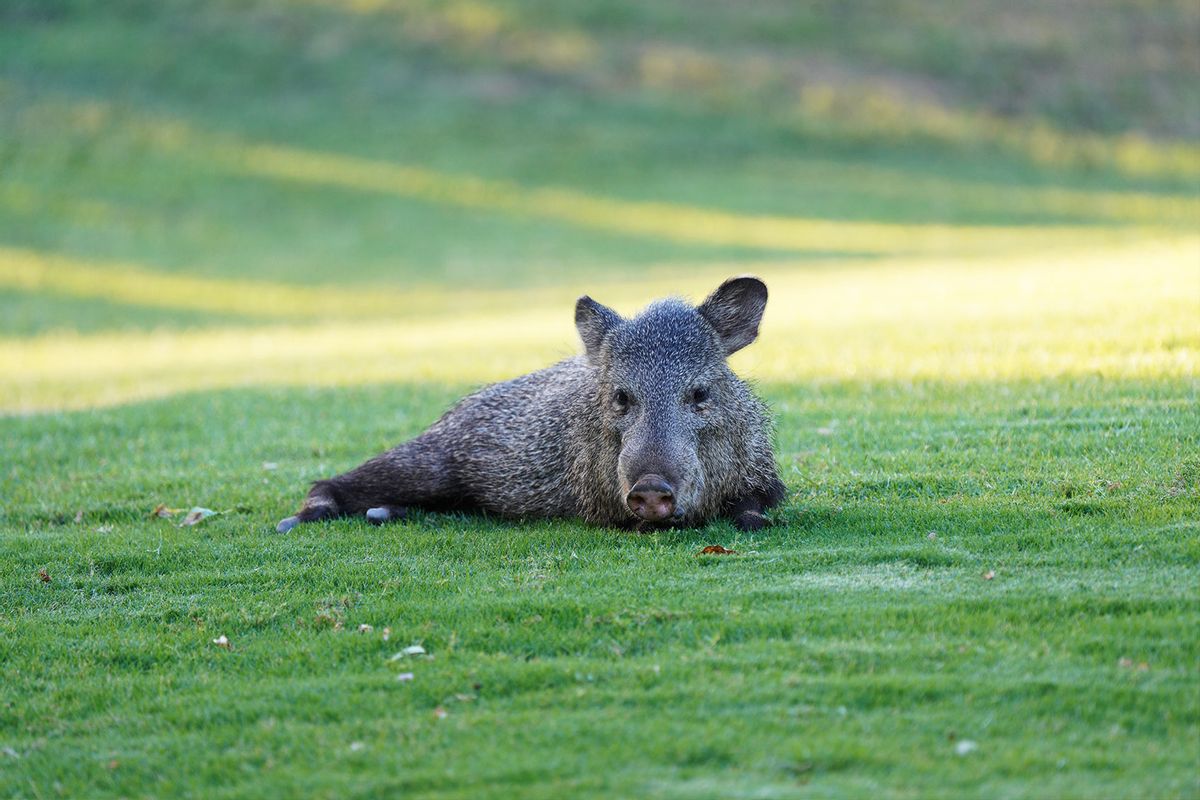She’s an eco-vengeance iconoclast who loves coyote pee and running at manic speeds. She’s an unstoppable chaos queen with a stink-nipple on her butt, who turns luxury Arizona golf courses into free range charcuterie boards for her grub-worm girl dinner. She’s a guerilla class-warfare legend whose mating call sounds like the hissing warb-garble of a cappuccino machine milk-steamer. She’s the internet’s most beloved trash-eating ungulate — the uncompromising, the indefatigable, the lovely javelina.
And if you haven’t seen her species’ latest tour of havoc through a high-end Sedona golf course, you’re missing out. A massive herd of “between 100 - 150” wild javelina — a.k.a. skunk pigs — have been terrorizing the water-guzzling Seven Canyons Golf Club in the state’s Coconino National Forest, leaving club owners searching for solutions in the wake of the javelina’s destruction for the past six weeks.
Also known as collared peccaries, 30 to 50 hellcatting javelina squadrons have been razing the course turf annually during their fall rush. But assistant superintendent Em Casey says the hunger-driven javelina insurgents are wrecking shop so hard this year that the course has to spend 45 to 50 hours a week repairing the damage. So far, the javelinas have hit eight spots on the course, from all sides.
“Come along with me on my carnage (I mean course) check this morning. What should be one of the most beautiful golf courses in the country is being destroyed by herds of javelina,” Casey said in a video posted to social media.
She’s the internet’s most beloved trash-eating ungulate — the uncompromising, the indefatigable, the lovely javelina.
The video has since racked up more than 25 million views as many online throngs flock to #TeamJavelina, cheering on the wild hogs’ berserker-mode reclamation of their natural habitat. Though the Arizona Alliance of Golf touted a $6-billion impact on the state made by golf courses — and “only 2% of Arizona’s daily water use” — an investigation by the Arizona Republic found courses in the state were over way over their daily water limits.
“What should be one of the most beautiful golf courses in the country is being destroyed by herds of javelina,” Casey wrote online.
Seven Canyons general manager David Bisbee has been on the case, though. With state wildlife officials providing the club a tally of the squadrons and the help of the club’s restaurant suppliers, Bisbee has tried a few different tactics on the javelina and says the club wants to “figure out a way to co-exist with them.”
Want more health and science stories in your inbox? Subscribe to Salon's weekly newsletter Lab Notes.
In 2021, the Arizona Republic found that across the state’s 219 golf courses, the average water use per course came out to about 450,000 gallons per day. That water is drawn from not only the Colorado River basin (which has seen better days, to say the least) but from groundwater sources — a sticking point in the state’s regulatory debate, and a much needed water source for the natural habitats of endangered local fauna.
The javelina are spurred on by a hunger-causing drought, seeking grazing greens and grub-worms on the course because it was carved out of the animals’ home turf. With less than 2 inches of rain this year in the Sedona area, the javelina are on a survival mission for food, compared to their relative quiet last year when the area saw up to 18 inches of rain.
“We had zero damage,” Bisbee told the Associated Press Tuesday.
But five years ago, during a particularly tough summer, the skunk pigs were running amok like they are now — sporting territory-marking scent glands on their rumps, which produce pungent odors from a nipple-like protrusion that humans can smell downwind. Seeking to drive them off, the club sprinkled granules of coyote urine around the course.
But did that stop the javelinas? Hell no. These little freaks absolutely loved it. The skunk pigs went berserk after doing bumps of coyote piss at the club, and then ran roughshod through a top-25 course that venerable sports publication Golf Digest ranks among the best in the country. Iconic.
“It was like putting bacon bits in their salad,” Bisbee said.
We need your help to stay independent
Now Bisbee says the club is working with its restaurant suppliers, trying to scorch the javelinas with a one-million Scoville-unit chili oil that the club can spray over the turf without killing it.
“We’re still trying to figure out the right formulation in the chili oil we put out. It’s a delicate thing for the grass,” Bisbee said. “It’s a continuing dance we do.”
But as Bisbee and the club keep dancing, the javelina are running circles around them — shredding whatever they want, whenever they want. If Seven Canyons really wants to prevent the javelina from snatching up their turf, the best thing it can do is stop chugging massive amounts of water in the middle of a desert preserve. Otherwise, these untameable trash-baddies are here to stay. Slay on, queens. Slay on.



Shares